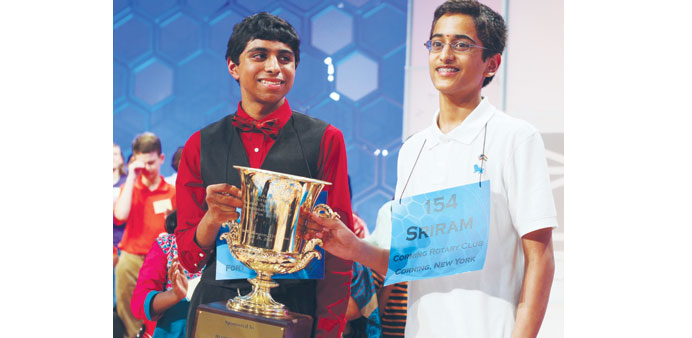Sujoe (left) of Fort Worth, Texas, and Jathwar of Painted Post, New York, hold the championship trophy after winning the 87th Scripps National Spelling Bee at the Gaylord National Resort and
Convention Centre in National Harbour, Maryland outside
Washington.
AFP
Two American teenagers of South Asian descent made spelling history on Thursday when they became the first co-winners of the Scripps National Spelling Bee in more than half a century.
Ansun Sujoe, 13, and Sriram Hathwar, 14, hoisted the glittering gold cup together after they saw off 10 other finalists before taking turns to exhaust the competition’s demanding word list.
In the nail-biting finale, Hathwar correctly spelled stichomythia, meaning a dialogue of altercation in Greek drama.
Then Sujoe stepped up to the microphone and learned that he and Hathwar would be co-champions if he nailed the last word of the night.
He did.
It was feuilleton, a noun for a newspaper supplement, which he spelled flawlessly despite admitting later that he’s sometimes uncomfortable with French-based words.
“Correct,” said official pronouncer Jacques Bailly, a classics professor and 1980 bee champion, triggering a shower of confetti and a standing ovation from the ballroom crowd in the Gaylord resort outside Washington.
The first joint champions since 1962 will each take home their own trophy cups as well as more than $30,000 in cash prizes, savings bonds and reference works.
The boys are also the seventh and eighth youngsters of South Asian heritage since 2008 to conquer the National Spelling Bee, an American institution since the 1920s.
“I try to study as hard as I can. I try to be true to myself (and) hope for the best,” Hathwar, who wore a small American and Indian flag button on his white polo shirt as a token of good luck, told AFP.
It was his fourth time at the National Spelling Bee, where he placed third last year. He once produced a TEDx talk on his competitive spelling experiences.
“What do I do next? Get back to normal stuff,” added Sujoe, sporting a snappy red bow tie.
He now expects to start coaching his younger sister so that she can follow in his spelling footsteps.
Sujoe, whose interests include programming robots and helping out at a senior citizens’ home, also competed last year. Champions are ineligible to return to future National Spelling Bees.
This year’s 281 contestants, aged eight to 15, hailed from all 50 states plus the Bahamas, Canada, China, Ghana, Jamaica, Japan, and South Korea as well as schools in Europe for US military families.
Last year, Arvind Mahankali, a 13-year-old New Yorker who placed third in 2011 and 2012, won top honours when he correctly spelled knaidel – a kind of dumpling – after a grueling 2.5-hour elimination final.
Of the 12 finalists this year, four were girls, and six hailed from families with South Asian roots – a reflection of the popularity of competitive spelling among Indian immigrant families.
Many of the winning words over National Spelling Bee history have taken their place in everyday English, such as condominium (1956), catamaran (1959), chihuahua (1967) and croissant (1970).
But Thursday’s words amounted to a cornucopia of obscure terminology like bamboche (a Haitian fete), croquignole (a hair-waving method), and shibuichi (a Japanese alloy).
Crowd favourite Jacob Daniel Williamson, a wise-cracking 15-year-old in a chequered shirt from Cape Coral, Florida, shouted “I know it!” from the stage when asked to spell kabaragoya, a kind of aquatic lizard.
Delight immediately gave way to defeat, however, when Williamson heard the dreaded bell after he erroneously started the word with a C.
Another finalist who struck out was 14-year-old Kate Miller of Abilene, Texas, who looked on the bright side after fumbling exochorion, the outer layer of an insect egg.
“I don’t need to study spelling anymore,” she said. “I’m going to go home and watch every horror movie on which I can get my hands.”

